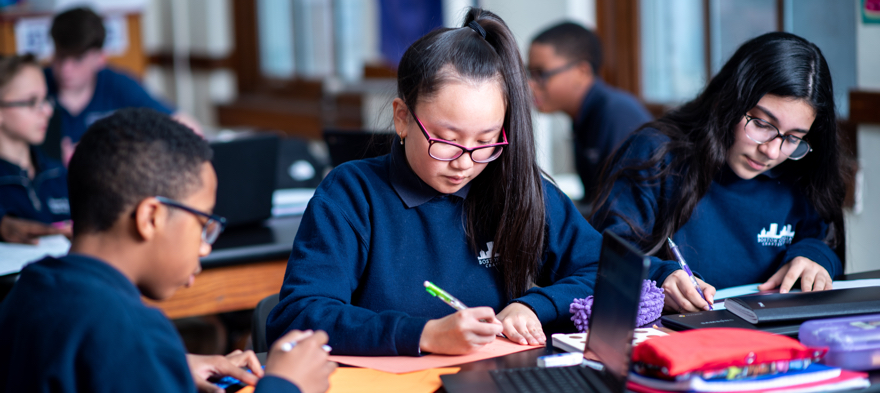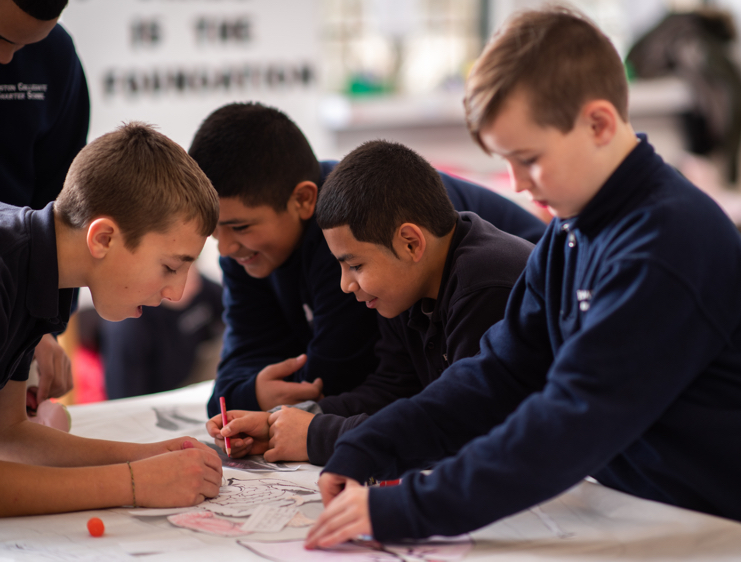
Aug 6, 2019 12:00:00 AM
by Tory MacKay
According to a recent report, one in five American students have learning or attention differences, with challenges ranging from dyslexia to ADHD and more. As a speech-language pathologist at Boston Collegiate Charter School (BCCS), I see the impact of these differences for two of my high school students—Sam and David—who face significant barriers to accessing higher education.
For Sam, this means it’s difficult to complete some of her college-level assignments, while David finds it challenging to manage courses in an independent environment. Although these learning differences are real, they should not prevent Sam and David from accessing the benefits of a college experience.
While some educators might assume that college is out of reach for students like Sam and David, at BCCS our unifying mission is to prepare each of our students for college. With a 16-year track record of preparing our high school graduates for success in four-year colleges, [pullquote]we set out to create a path that works for our students who learn differently.[/pullquote] And it’s not just our mission driving us; research shows that students transition to young adulthood more readily when they have the opportunity to engage in college-related activities while still enrolled in high school.
This past year, BCCS participated in the Massachusetts Inclusive Concurrent Enrollment Initiative (MAICEI), where special education high school students can take courses at Boston-area colleges and universities with support that includes counseling and peer mentoring. Thanks to this initiative, Sam and David both enrolled in a world music course last year at UMass Boston. Not only did they learn about music, but they also gained valuable lifelong skills and confidence.

David had a traditional junior year high school course load, so fitting the music course into his schedule and navigating the assignments at UMass Boston was challenging. At one point, he came to me panicking because he was having trouble navigating his Google Drive account to submit an assignment. I was tempted to solve it for him, but instead encouraged him to reach out to the professor directly.
David figured it out, received an “A” on his assignment and learned that he can advocate for himself with adults and successfully overcome any problems he may face. [pullquote position="right"]David began to take more ownership of the challenges he faced in the classroom[/pullquote] and learning how to balance the academic demands of a college class in addition to work and home responsibilities.
Sam had an alternative junior year course load, which allowed her more flexibility to participate in the MAICEI program. Along with her college course, Sam had the opportunity to work with peer mentors who helped her navigate different aspects of the college experience, build study skills and explore different career paths.
Sam’s peer mentors also provided insight into how to join into different social groups and make the most of the facilities provided at Umass Boston. Through the program, [pullquote position="left"]Sam was able to experience college and build her independence and communication skills.[/pullquote]
For example, Sam had been working for two years to take public transportation by herself from her home to school, but was still not ready prior to her junior year. When she first started the course at UMass Boston, her parents would drop her off and faculty from BCCS would pick her up. However, when Sam saw the other students taking the shuttle bus to the T, she was motivated to get back and forth by herself. Sam’s experience shows why simply being exposed to a college environment can be so powerful for high school students who learn differently.
A year ago, we never would have imagined that Sam and David could not only enroll in a college-level course, but also thrive with their new-found independence. We’re already looking at our rising juniors and seniors to identify other students who may be a fit for MAICEI so we expand the reach of this program.
I hope other local high schools will find ways to open the door to higher education for the thousands of young people like Sam and David whose potential is just waiting to be unlocked.
Tory MacKay is a speech and language pathologist at Boston Collegiate Charter School (BCCS). She joined BCCS after graduating from Old Dominion University with a master’s degree in speech-language pathology. Prior to joining BCCS, Tory completed clinical practicums with pediatric and adult clients. She enjoys traveling, running and completing half marathons and is a die-hard fan of the New York Giants football.
The story you tell yourself about your own math ability tends to become true. This isn’t some Oprah aphorism about attracting what you want from the universe. Well, I guess it kind of is, but...
If you have a child with disabilities, you’re not alone: According to the latest data, over 7 million American schoolchildren — 14% of all students ages 3-21 — are classified as eligible for special...
The fight for educational equity has never been just about schools. The real North Star for this work is providing opportunities for each child to thrive into adulthood. This means that our advocacy...
Your donations support the voices who challenge decision makers to provide the learning opportunities all children need to thrive.
Ed Post is the flagship website platform of brightbeam, a 501(c3) network of education activists and influencers demanding a better education and a brighter future for every child.
© 2020–2024 brightbeam. All rights reserved.
Leave a Comment